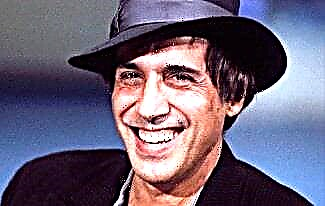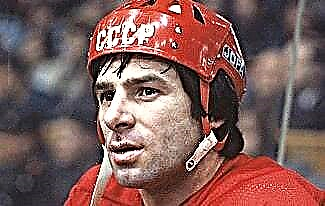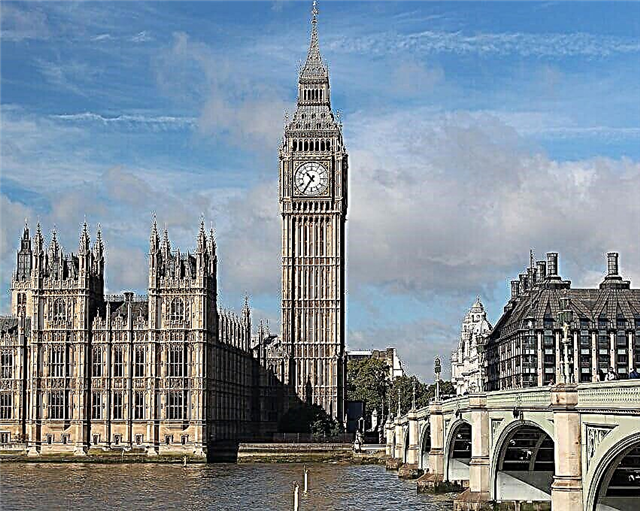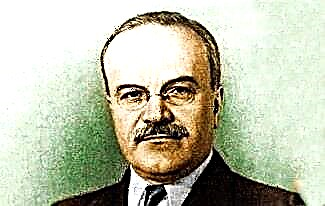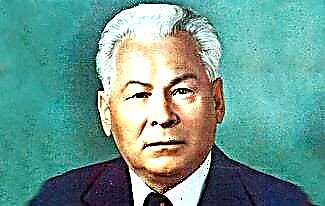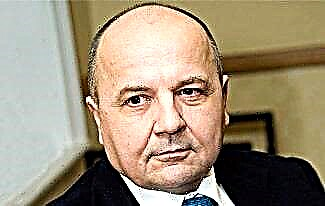Boris Godunov (1552 - 1605) has an unenviable place in Russian history. And personally, historians do not favor Tsar Boris: he either tortured Tsarevich Dmitry, or ordered him to torture him, and intrigued countlessly, and did not favor political opponents.

Boris Godunov also got it from the masters of the arts. Even a person who is ignorant of history has probably read or heard in the cinema a replica of Bulgakov's Ivan Vasilyevich the Terrible: “Which Boris the Tsar? Boriska ?! Boris for the kingdom? .. So he, the crafty, despicable paid the king for the kindest! .. He himself wanted to reign and possess everything! .. Guilty of death! " Just a few words, but the image of Godunov - cunning, cunning and mean, is already ready. Only Ivan the Terrible, one of whose closest associates was Godunov, did not and could not say that. And these words Bulgakov took from the correspondence between Andrei Kurbsky and Grozny, and it was from Kurbsky's letter.
In the tragedy of the same name by Pushkin, the image of Boris Godunov is shown with sufficient reliability. Pushkin Boris, however, is tormented by doubts whether Tsarevich Dmitry is really dead, and too much attention is paid to the enslavement of the peasants, but in general, Pushkin's Godunov turned out to be similar to the original.

Scene from the opera by M. Mussorgsky based on the tragedy of A. Pushkin "Boris Godunov"
How did the tsar who ruled Russia at the turn of the 16th - 17th centuries lived and died?
1. There is almost no information about the origin and childhood of Boris. It is known that he was the son of a Kostroma landowner, who, in turn, was the son of a nobleman. The Godunovs themselves were descended from the Tatar prince. The conclusion about the literacy of Boris Godunov is made on the basis of a donation written by him with his own hand. Kings, according to the tradition, did not stain their hands with ink.
2. Boris's parents died early, he and his sister were cared for by the boyar Dmitry Godunov, who was close to Ivan the Terrible, and his uncle. Dmitry, despite his "thinness", made a brilliant career in the guardsmen. He occupied about the same place under the tsar as Malyuta Skuratov. Quite naturally, the middle daughter of Skuratov Maria became the wife of Boris Godunov.
3. Already at the age of 19, Boris was the groom's boyfriend at the wedding of Ivan the Terrible with Martha Sobakina, that is, the tsar already had time to appreciate the young man. Godunov's cronies performed the same position when the tsar got married for the fifth time.

Wedding of Ivan the Terrible and Martha Sobakina
4. Boris Godunov's sister Irina was married to Ivan the Terrible's son Fyodor, who later inherited the throne of his father. 9 days after her husband's death, Irina took her hair as a nun. The nun queen died in 1603.
5. On the day when Fyodor Ivanovich was married to the kingdom (May 31, 1584), he conferred the rank of equestrian on Godunov. At that time, the boyar-equestrian belonged to the circle closest to the king. However, no matter how Ivan the Terrible broke the ancestral principle, it was not possible to completely eradicate it, and even after the wedding to the kingdom, the representatives of the older clans called Godunov a "worker". Such was the autocracy.

Tsar Fyodor Ivanovich
6. Fyodor Ivanovich was a very pious man (of course, historians of the 19th century considered this property of the soul, if not madness, then certainly a form of dementia - the tsar prayed a lot, went on a pilgrimage once a week, no joke). Godunov began to solve administrative matters on the sly. Large construction projects began, the salaries of the sovereign's servants were raised, and they began to catch and punish bribe-takers.
7. Under Boris Godunov, a patriarch first appeared in Russia. In 1588, Ecumenical Patriarch Jeremiah II arrived in Moscow. At first, he was offered the post of Russian patriarch, but Jeremiah refused, citing the opinion of his clerics. Then the Consecrated Council was convened, which nominated three candidates. Of these (in strict accordance with the procedure adopted in Constantinople), Boris, who was then in charge of the affairs of the state, chose Metropolitan Job. His enthronement took place on January 26, 1589.

First Russian Patriarch Job
8. Two years later, the Russian army under the command of Godunov and Fyodor Mstislavsky put the Crimean horde to flight. To understand the danger of the Crimean raids, a few lines from the chronicle are enough, in which it is proudly reported that the Russians pursued the Tatars “to the very Tula”.
9. In 1595, Godunov concluded a peace treaty with the Swedes that was successful for Russia, according to which the lands lost in the unsuccessful debut of the Livonian War returned to Russia.
10. Andrey Chokhov cast the Tsar Cannon at the direction of Godunov. They were not going to shoot from it - the gun does not even have a seed hole. They created a weapon as a symbol of the power of the state. Chokhov also made the Tsar Bell, but it has not survived to this day.

11. Starting with Karamzin and Kostomarov, historians accuse Godunov of terrible intrigue. According to them, he consistently discredited and removed several members of the Board of Trustees from Tsar Fyodor Ivanovich. But even an acquaintance with the events presented by these historians shows that the noble boyars wanted Tsar Fyodor to divorce Irina Godunova. Fyodor loved his wife, and Boris defended his sister with all his might. It was necessary for Messrs. Shuisky, Mstislavsky and Romanov to go to the Kirillo-Belozersky Monastery.
12. Under Godunov, Russia has grown impressively with Siberia. Khan Kuchum was finally defeated, Tyumen, Tobolsk, Berezov, Surgut, Tara, Tomsk were founded. Godunov demanded to do business with local tribes "weasel". This attitude laid a good foundation for the next half century as the Russians took to the shores of the Pacific Ocean.

Russia under Boris Godunov
13. Historians have long been breaking spears over the “Uglich affair” - the murder of Tsarevich Dmitry in Uglich. For a very long time, Godunov was considered the main culprit and beneficiary of the murder. Karamzin directly stated that Godunov was separated from the throne only by a little boy. The venerable and overly emotional historian did not take into account several more factors: between Boris and the throne lay at least another 8 years (the prince was killed in 1591, and Boris was elected Tsar only in 1598) and the actual election of Godunov as tsar at the Zemsky Sobor.

The assassination of Tsarevich Dmitry
14. After the death of Tsar Fyodor Godunov retired to a monastery and for a month after Irina's tonsure the ruler was absent from the state. Only on February 17, 1598, the Zemsky Sobor elected Godunov to the throne, and on September 1 Godunov was crowned king.
15. The first days after the wedding to the kingdom turned out to be rich in awards and privileges. Boris Godunov has doubled the salary of all employees. The merchants were exempted from duties for two years, and farmers from taxes for a year. A general amnesty took place. Considerable money was given to widows and orphans. Foreigners were freed from yasak for a year. Hundreds of people were promoted in ranks and ranks.
16. The first students sent abroad did not appear at all under Peter the Great, but under Boris Godunov. As well as the first "defectors" did not appear under the Soviet regime, but under Godunov - out of a dozen youths sent to study, only one returned to Russia.
17. The Russian Troubles, which the country barely survived, did not begin because of the weakness or bad rule of Boris Godunov. It did not even begin when the Pretender appeared on the western outskirts of the state. It began when some of the boyars saw benefits for themselves in the appearance of the Pretender and the weakening of the royal power, and began to secretly support False Dmitry.
18. In 1601 - 1603 Russia was struck by a terrible famine. Its original cause was a natural disaster - the eruption of Huaynaputina volcano (!!!) in Peru provoked the Little Ice Age. The air temperature dropped, and the cultivated plants did not have time to ripen. But famine was aggravated by a crisis of governance. Tsar Boris began to distribute money to the starving, and hundreds of thousands of people rushed to Moscow. At the same time, the price of bread increased 100 times. Boyars and monasteries (not all, of course, but very many) held back the bread in anticipation of even higher prices. As a result, tens of thousands of people died of hunger. People ate rats, mice, and even dung. A terrible blow was dealt not only to the country's economy, but also to the authority of Boris Godunov. After such a catastrophe, any words that punishment was sent to people for the sins of "Boriska" seemed to be true.
19. As soon as the hunger ended, False Dmitry appeared. For all the absurdity of his appearance, he represented a considerable danger, which Godunov recognized too late. And it was difficult for a devout person in those days to assume that even high-ranking boyars, who knew perfectly well that the real Dmitry had been dead for many years, and who kissed the cross with an oath to Godunov could so easily betray.
20. Boris Godunov died on April 13, 1605. A few hours before the death of the king, he looked healthy and vigorous, but then he felt weak, and blood began to flow from his nose and ears. There were rumors of poisoning and even suicide, but it is likely that Boris died of natural causes - over the past six years of his life, he was seriously ill several times.


